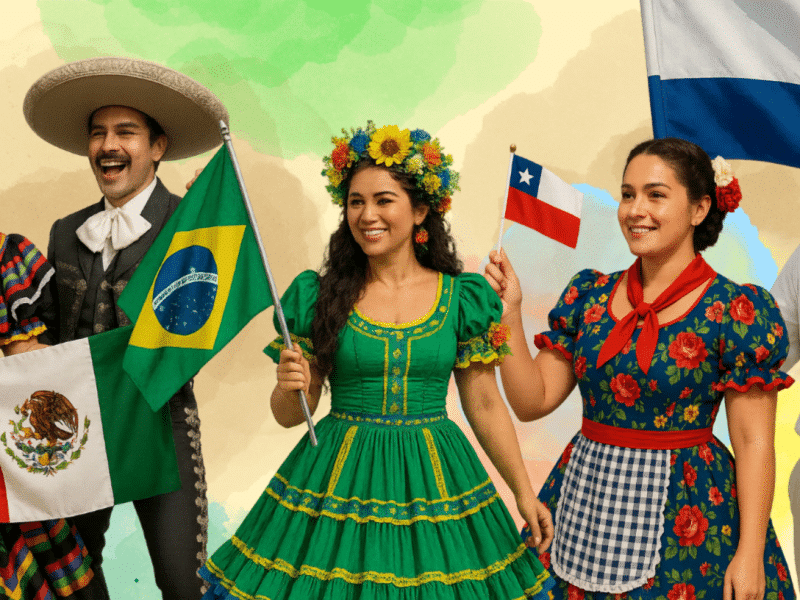Mother’s Day: It’s Complicated for Many Latinas
Mother’s Day isn’t always all flowers and hugs. For many Latinas, it’s a complex dance of setting boundaries or even severing ties with toxic or marianismo-influenced moms. Why? Because self-care isn’t selfish, it’s survival.

Mother’s Day is a day meant to honor and celebrate the special bond we share with our mothers or mother figures. The holiday is celebrated on the second Sunday of May in the U.S. and in some Latin American countries, like Cuba, Chile, Colombia, Puerto Rico, Ecuador, Honduras, and Venezuela. However, some Latina mothers celebrate the holiday twice, depending on where they’re from. For example, mothers of Mexican, Guatemalan, or Salvadoran descent will also observe Mother’s Day on May 10, so it’s a double celebration for them. Argentina, Costa Rica, Nicaragua, Bolivia, Dominican Republic, Paraguay, and Panama have their own dates as well.
Usually, Mother’s Day is all about connecting with our mothers and pampering them throughout the day. For many Latina daughters, though, it’s not a happy occasion. Mother’s Day can be very complicated when your relationship with your mother is not a healthy one and you’ve made the decision to break or diminish ties with her. That’s the reality for many Latinas who have prioritized their own mental health and well-being by creating solid boundaries.
Marianismo often plays a role in difficult mother-daughter relationships. Rooted in Christianity, or rather the Roman Catholic beliefs the Spanish indoctrinated their newly conquered native subjects with during colonialism, marianismo is the other side of machismo. It defines gender-based expectations for Latin American women and it’s deeply ingrained in Latino culture. It’s because of marianismo that Latina women are taught from a young age that they have to be submissive, self-sacrificing, and pure. In other words, they have to be quiet instead of loud, weak instead of strong and are consistently discouraged from being independent, sexual, opinionated, and a host of other empowered traits.
The idea behind marianismo is to be more like the Virgin Mary, a figure that’s considered to be the epitome of purity and goodness. Whether the messaging is subtle or explicit, marianismo in the Latino household imposes a narrow concept of what it means to be a woman and it reinforces powerlessness. It’s important to note that marianismo is not a burden every Latina carries, but many of them do.
In Latin American countries, society helps reinforce marianismo. In the U.S., things are slightly different, which is why first-generation immigrants break away from it more effectively. But this sometimes also means breaking away from their mothers, who often refuse to confront their harmful marianismo beliefs.
There’s no denying that the mother-daughter bond is one of the most important in a woman’s life. For Latinas in particular, mothers are highly influential figures in our lives. But what if your relationship with your mother is toxic and complicated? In Latino culture, it’s taboo to say anything negative about our mothers. Being critical of them means you’re “ungrateful,” but the truth is that some mothers fail their daughters. Especially in helping them foster an independent sense of self. Some mothers want their daughters to be a certain way instead of allowing them to be their own person, which is why they’re often critical and overly demanding.
Many Latinas have grown up with mothers who are too comfortable pointing out their flaws or dictating how they should be or act. This leads to constant opposition and a constant struggle to just be yourself. It makes many Latina daughters feel that who they are at their core is not good enough and fosters self-doubt at a level that affects everything else in their lives. Even as adults, we want our mothers to approve of us and love us for who we are, but there comes a time when enough is enough. There’s only so much toxic criticism one can take.
This is what leads many Latina daughters to cut ties with their mothers, however painful that may be. Needless to say, estrangement is frowned upon in the Latino community because we place a lot of value on family. “It doesn’t matter what we do to each other, at the end of the day, we’re family.” That’s the kind of mindset most Latinos have, but it’s neither healthy nor realistic. The way we treat each other matters and being related doesn’t mean we can get away with harmful behavior.
In general, estrangement is seen as extreme and as a problem in itself. However, for many, estrangement is the solution and the relief they’ve been searching for. Make no mistake, the dilemma Latina daughters are often faced with is unsolvable. Choosing between having a relationship with your mother and doing what’s best for your own life isn’t as easy as it seems. However, it’s often the only thing left to do after you’ve tried everything else to have a better relationship with your mother.
There comes a point where you’re better off without them in your life. That’s a harsh truth to face because, even if estrangement is what’s best for you, you both lose something. But for many Latinas, that loss is a new beginning. It’s a weight lifted off their shoulders and a deep sigh of relief. It’s sad and tragic that it has to end that way, but it’s better than the alternative of maintaining that toxic mother-daughter relationship.
On a larger scale, estrangement can help the Latino culture heal in the long term. Setting boundaries with our families, which isn’t something we’re encouraged to do in the Latino community, means we’re no longer letting abuse slide. The romanticization of family bonds and self-sacrifice doesn’t have the same hold. Rejecting that romanticization and rejecting marianismo is a way to help break the cycle.
Intergenerational emotional and psychological abuse has to be confronted and, sometimes, extreme measures are the only way to help the older generation face their harmful beliefs and values, and reframe what needs to be reframed. Setting boundaries is a shock to the system; a shock that lets our mothers and everyone else in our families know what kind of behavior isn’t acceptable anymore and never should’ve been in the first place. After that, the ball is in their court. They can either adapt or lose the privilege of being a part of your life.
While, for some, Mother’s Day is a celebration of the bonds they share with their mothers, for others, it’s a reminder of the breaking of those bonds. Whatever side you’re on, remember that love and respect is a two-way street.




